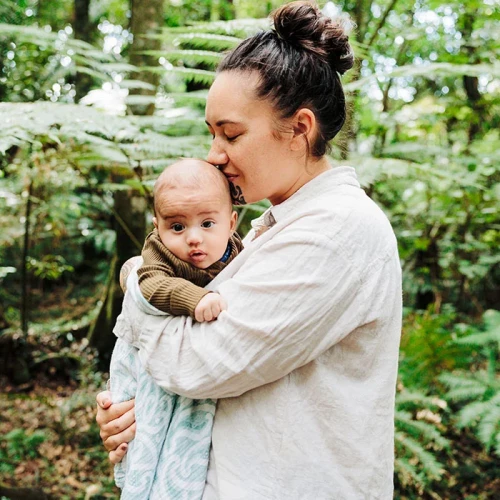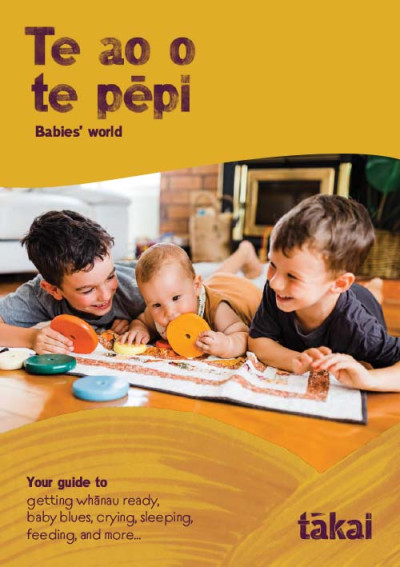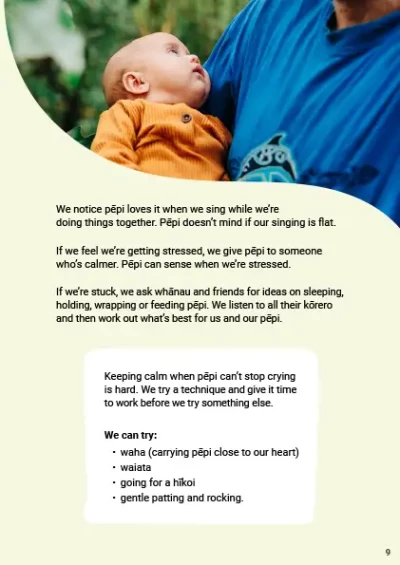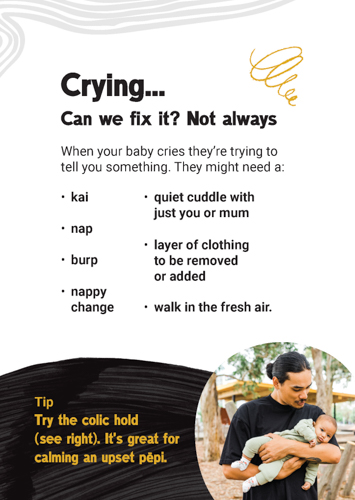
Crying and ways to soothe baby
It can sometimes be challenging to support pēpi when they cry a lot, and this can be distressing for whānau. Knowing how to remain calm in order to respond and soothe baby back into a calm state is an important first step for whānau.
Check baby
Crying is one way pēpi communicates with us. Check if they're hungry, need their nappy changed, or are too hot or cold. They may be tired or need some company. Always trust yourself and seek medical help if you think pēpi is sick.

Show them you care
Responding to your baby when they cry builds trust and is important for them to feel content and secure. You cannot spoil pēpi by doing what you can to soothe them. Their crying means they want you, or need your help.

Be gentle and calm
Pēpi responds to your tone and feelings, so staying calm will help support them to calm down too. Never shake a baby. Ask for help if you’re getting wound up by baby’s crying – phone a friend or whānau member if you're home alone.

Burping baby
Trapped wind can be really painful for baby and cause them to become overly upset. If they’ve just had a feed, try burping them again gently or hold them upright against you while you walk or rock them to help relieve any pain.

Try getting outside
A walk in the fresh air in a front pack or buggy can help calm you and pēpi down. The rhythm of the journey might even get them off to sleep, especially if they're overtired.

All pēpi cry – this is how they communicate what they need or how they're feeling. Pēpi co-regulate, which means they need you to support them to calm down.
Responding to crying builds trust
Responding to pēpi crying is important for them to feel content and safe, and supports their learning and brain development. It is impossible to spoil pēpi by responding to their cries and trying to soothe them. Sometimes our efforts will mean that pēpi stops crying, sometimes they won't, but we still have an important role in being there so they are not alone.
There's no such thing as the perfect parent and you won't always be able to attend to pēpi crying straight away, especially if you're in the middle of an important task. Responding as quickly as you are able, and most of the time, will still build this trust relationship with pēpi.
Ways to calm a crying baby
The suggestions below will help whānau support and soothe their pēpi.
Check pēpi
It can help to check the 'basics' and run through the following checklist in your head – are they hungry, does their nappy need changing, are they too cold or too hot? Parents should trust their gut and seek medical help if they think pēpi is unwell. If, however, you think that they're overtired, have wind or need some support because they've become too upset, the following tips will help.
Try to stay calm too
Our pēpi are particularly tuned in to our emotions and how we're feeling, so if you're able to stay calm, that will support them to as well. Waiata, gentle rocking, watching the trees or nature out the window and taking deep breaths all support you to remain calm while you hold pēpi close to you. Going for a walk with pēpi in a front pack or buggy or taking a bath or shower together (if pēpi generally enjoys this) can also support you both to calm down.
Learn to identify some of the early signs of tiredness
Crying can peak between 2 and 12 weeks old. Babies may cry more in the late afternoon and early evening, suggesting overtiredness may have an influence.
Tired signs in babies and toddlers | Raising Children Australia(external link)
Try to be consistent
If possible, resist the urge to jump quickly between different soothing techniques if something doesn't appear to work straight away. Stick with whatever feels okay for you – rocking, singing, going for a walk – and even if it doesn't calm pēpi down immediately, it may help over time as they begin to learn that this is what you do to support them. Repetition and consistency are key to successful soothing and can help pēpi to recognise the cues that eventually help them calm.
When nothing seems to be working
It can be upsetting for whānau when it feels like they can’t soothe their pēpi. And for parents who have a number of young tamariki, it might seem like everyone is crying at the same time and this can be very stressful!
Parents need to monitor their own feelings and their response to baby’s crying. If they feel they’re starting to ‘lose it’, it’s time to put baby down somewhere safe (preferably in their cot), move away and take a break. Or ask for help from a partner, friend or whānau member.
While pēpi is safe or with someone else who can support them, parents can distract themselves briefly by hanging out the washing, taking some deep breaths in the garden or having a quick shower before attending to pēpi again.
It is never ever OK to shake a baby. Forceful shaking can cause head injury.
Ask for help
Remind whānau that it’s OK to ask for help if they’re getting wound up by their baby’s crying. It’s a good idea to work out a list of who they might contact in this situation. Crying affects parents the most because they're so connected to pēpi and their big emotions are contagious. So, it’s very helpful if someone else can take over and try to calm baby during these times.
 pdf 8.7 MB
pdf 8.7 MB













